Free Fiction
This week’s story is a humorous mystery called The African Queen.
A first date, a crime and a geeky video store clerk who channels Humphrey Bogart. Welcome to the jungle Casey Bigelow. Click Here.
This week’s story is a humorous mystery called The African Queen.
A first date, a crime and a geeky video store clerk who channels Humphrey Bogart. Welcome to the jungle Casey Bigelow. Click Here.
I recently had a spate of medical tests that involved injected dyes and C.T. scans. There I was, laying on this human-sized platter waiting to get dragged through this donut-shaped machine with multiple monitors and IV tubes and straps etc. hanging from spider-like ceiling beams to snake into my arms. It was all a new experience for me and not one I particularly liked, but the newness shocked me into taking heed of all the sensations and what was going on. It reminded me of the importance of being in the moment for writers.
I’ve always been taught that being in the moment involves being ‘present’. That means that you are fully aware of what is happening to and around you, including all of your bodily sensations. It is not allowing all the thoughts about where you want to be and how to get there, or the thoughts of where you were and your various regrets, to get in the way of attending to where you are.
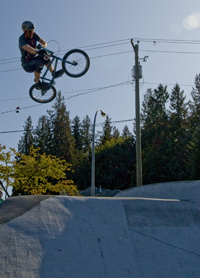
Sounds like a simple concept, but it’s harder than you know. Try going for a walk and just attending to the feelings in your body and your surroundings. Don’t be surprised when you come-to thinking about what to cook for dinner tonight, or your job, or the blog you need to write for next week. It’s a lot like suddenly becoming aware you’ve almost arrived at your destination and for the life of you, you can’t recall the driving. You’ve totally zoned out and as a result you’ve missed the scenery along the drive, or the birds in the trees, or the scent of an unusual flower. Or life, for that matter.
All of us do this. We’re so incredibly busy running from issue to issue and task to task in our lives that we feel we HAVE to double and triple multitask in order to get everything done. Heck, I do this knowingly every time I go for a walk and try to work through a plot problem.
As a writer we need to be aware of this tendency and to work on being in the moment. If we do so we can find the marvelous little details, or the glimpses of the human condition that can make our writing richer. From my time on the human platter I’m going to remember the burn of the dyes as it moved through my blood stream and the taste of hot copper taste on the back of my tongue. They’ll appear somewhere in my writing, because being in the moment, I noticed them.
I wasn’t sure what I was going to write this blog about because I saw so little of the Lake Titicaca area, but perhaps that’s the point. Sometimes things get in the way of best intentions and we either can’t or just don’t get the job finished for whatever reason. This certainly happens in writing, when health or other life issues get in the way. So I guess this is my turn. Just in case anyone was worried, I seem to be fine. The high blood pressure meds seem to have done the trick and I am going to get checked out before the Machu Picchu climb. But that’s all fodder for a next post.
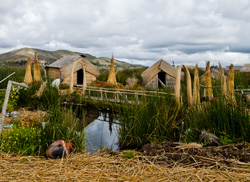
Let me tell you about Puno.
Puno sits on the shore of Lake Titicaca, running up the sides of a number of hills that roll down to the great northwestern bay of the lake. My bus arrived in the night, so we crammed three of us (from the bus) into a shared taxi to get to our various hotels. All well and good, until we left the bus terminal and headed into the streets. Think narrow enough two cars can’t pass. Think congested with cars, trucks, motorcycle-taxis that they call ‘chilos’, as well as bicycle rickshaws. And pedestrians. Don’t forget the pedestrians. Masses of them, blithely passing between the vehicles. In the night everything smelled like car exhaust , and the air was glossy with mist off the lake. And pollution. OK, I thought: this seems rather Dante-esque, but it was night and I was tired and so I let it pass, because I’d seen worse in other countries.
The next day, the day I finally saw the doctor, I went out for a walk. Grotty was about the best I could describe it. Now maybe it was me – I was unstable enough on my feet I actually got lost twice – and I rarely get lost, but the city seemed in a perpetual state of being unfinished. Everywhere you looked there were brick buildings with iron poles sticking out of the roof awaiting the next story. Even my guest house, which was up-scale on the scale of guest houses I’ve been staying in, had its courtyard dug up and the front entrance perpetually stuck in a heap of dirt-cum-mud.
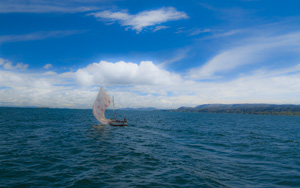
Not impressive, to say the least. Not a place you’d want to spend any more time than you had to, even though the streets were filled with delightful ladies in traditional bowler hats and absolutely everyone I had contact with was wonderful. My plans for Puno had been to use it as a base to do research farther afield. I had planned to go out to one of the islands in the lake and live there a few days, but given how I was feeling it seemed like a particularly stupid idea to put myself that far from a doctor.
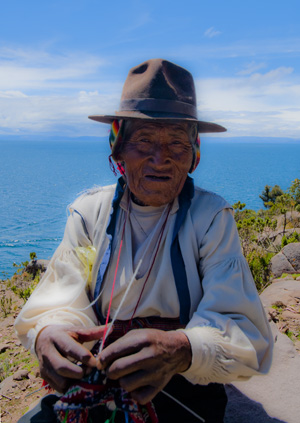
So instead I did what I never do: I booked into a – dare I say it – a tour. A one day tour out to Isla Tranquile. I figured there was no way they were going to stress me out, and I could at least see something of the lake.
Of course I was wrong.
A wonderful day – brisk wind, blue skies and the scent of wet mud you get from a marsh as we first visited the floating islands of Lake Titicaca. These are islands built of a layer of matted root and then heaped on top with reeds. Whole towns exist on these islands. And if you don’t like your neighbor, you just pull up your ten anchors and float away to Bolivia. Think about how easy ending a marriage would be!
From there we headed to Tranquile. I’m picturing a landing, a light walk and lunch. The real picture relates to the fact that Tranquile is basically a mountain. So we land, and I’m looking at an uphill climb. Way uphill. We have to reach the top for our lunch. And of course I’m carrying about 35 pounds of camera equipment that I will not leave unchaperoned on the boat.

At 14,000 feet this was not an easy hike, but the panting was worth it. Isla Tranquile sits in glacier-blue waters, its steep sides terraced with green, and laced with gold flowers. The sounds of birds and the call of children fill the air. The old men sit knitting (Tranquile is a UNESCO site for its fine fabric weaving and knitting) and its women constantly spin a weaving bobbin. You see them everywhere and they produce absolutely beautiful knit wear. The island is also famous for its gender roles. Men gain their worth by having a wife gift them with many handmade purses. The women cut their hair and weave it into a belt for their future husband. They also cut their hair to produce long falls that the men wear in ancient, Andean ceremonies. When you look at these faces, they have the same high cheek bones and hawk nose of the Incans and some say that Lake Titicaca is where The Inca – the first Inca – came from.
Which brings me back to Puno. I felt bad to leave the city without exploring it better. I climbed on the bus this morning feeling something of a failure, because I don’t like to leave things unfinished. Which is perhaps why Puno’s appearance that the whole place was under construction or reconstruction left me so unsettled.
But I learned from the guide on the bus that my perception was correct. Apparently the government of this department (state) only requires citizens to pay taxes on a finished house….
So I’m holding to that: Like the homeowners of Puno, sometimes in writing and travel it pays to leave things undone.
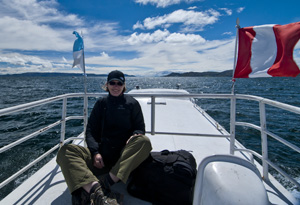
The other day, in the midst of planning my trip to Peru I had that old familiar rush of anxiety that I’ve had when planning for every other trip I’ve ever taken. It’s what I call the ‘oh shit’ moment.
I first came across this feeling when I was in my late twenties. I’d foolishly decided to relive my teen-age years by climbing onto a set of water skis. There I was at the end of a whiplashing line skimming along the water so fast I thought I was flying. Then the ‘oh shit’ moment arrived and all I could think of was ‘what the heck am I doing???????’ and ‘this is going to hurt like heck if I go down’.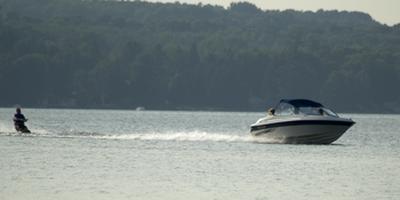
And I did. Hard.
But I walked away with most of my pride. I’d tried it at least.
So planning a trip, or a book for that matter, can be a lot like the anticipation I had waiting to go up on those skis. I want to do it. I need to do it. But darn it, it can be scary.
I knew I was going to be whipping at the end of that line, just like I know I’m going to be stepping off of a plane into some place I’ve never been before. Some place I don’t speak the language or know the culture. Some place I don’t know if I’ll have the courage to get through.
Now that’s deep water. For a lot of people, that’s when they stop.
But that, to me, is part of what travel is all about. I don’t live in the age of exploration and I don’t have the physical prowess to climb mountains—so I do this. Run off to experience other places and the ways that people live. So the ‘oh shit’ moment is something to push through to prove myself.
In that way, each time I start a new book I find there’s an ‘oh shit’ moment. That’s when you open the computer to that blank page and say “okay, hands, start typing”. Like with the travel, I don’t really know where I’m going, the culture, or the characters I’ll meet, or if I’m prepared for the geography. Sure, I have plans, but we all know about plans.
I used to plot out everything just like I’d plan a trip, but what I found was it took the spontaneity out of the whole experience. I’ve actually found that I get frustrated when I plan a trip in too much detail, or when someone plans it for me. Having an itinerary means I can’t stay that extra day or take the time to step off of the beaten path or listen to locals about the road less travelled. The same can be said of a manuscript. Sure, having an outline can give you direction, but does it allow your characters to have adventures you never even imagined?
Travelling alone without any itinerary other than I know I want to go to this list of places (and sometimes I have to choose between them) means that yes, there are frustrations and yes, things might not always go as planned, but you also get some enormous gifts. Like meeting the young woman at Burma’s Schwedagon Pagoda who told me her tragic tale of love gone wrong, or stopping at the side of the road in Cambodia to meet shadow-puppet-making orphans whose story was so sad I ended up crying, or having dinner on the roof of a Rajasthani house with a family I met on the streets of a small Moghul fortress town. I learned so much from those encounters. Things I never would have had if I’d stuck to an itinerary.
And the same thing happens with writing. Yes, there’s the panicked feeling of not knowing where a story is going, and the fear that comes when I think things like ‘Dear god, I have to be coming to a mid-point climax, but I’m not sure what it is’. But I live with the fear and then, suddenly, by magic the driving direction or the climax appears. And it’s usually better than I ever could have imagined.
So when I feel that ‘oh shit’ moment when planning a trip, or starting a manuscript, or even when I’m caught in the middle, I remind myself that the ‘oh shit’ moment is more like the feeling the race horse must get in the gate: anticipation at the race. And wonder at what might be around the first turn.
The whiplash at the end of the line, or the gift of feeling like you’re flying.
And even if you fall, you had fun while you were trying.